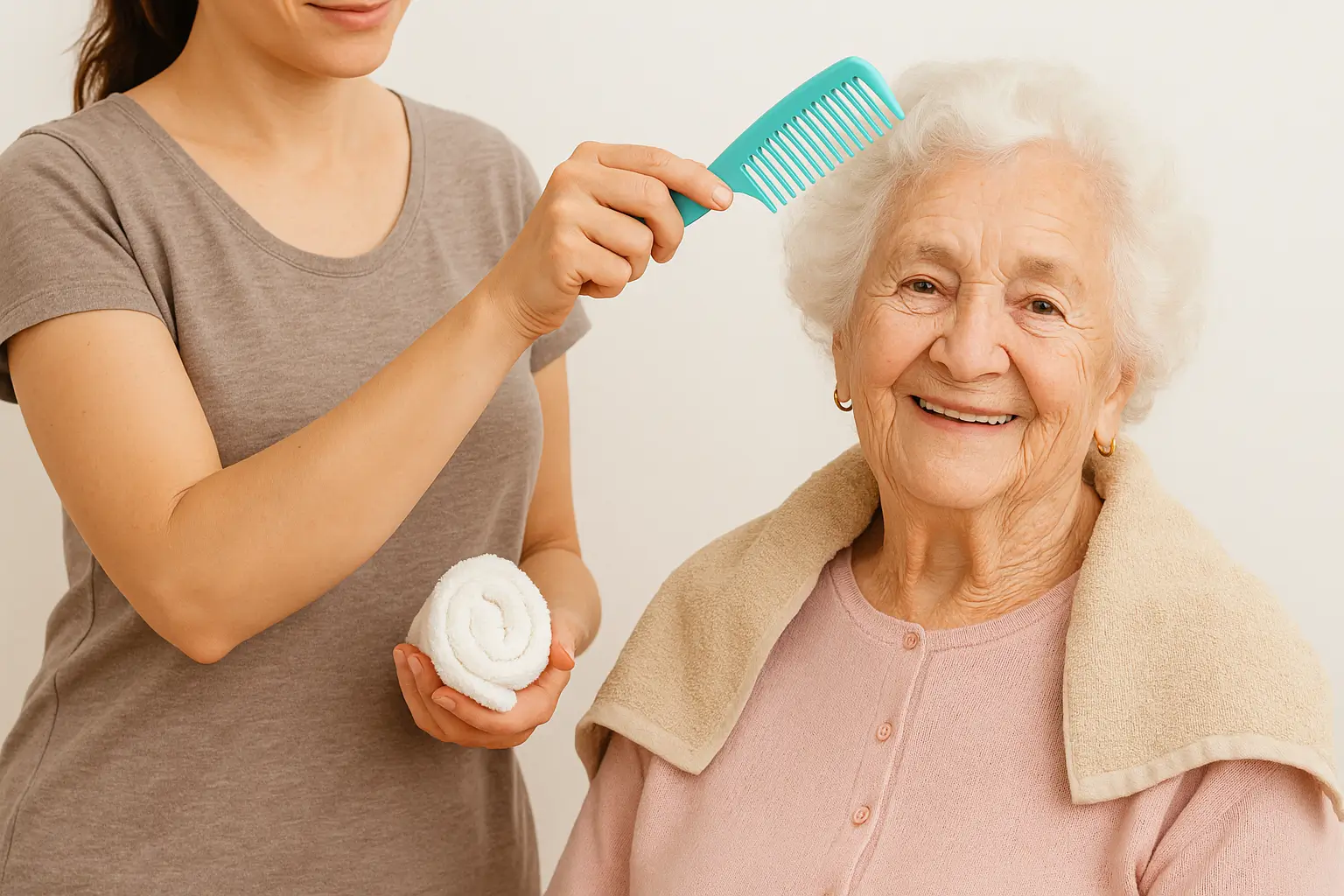Elderly Care: Hygiene & Grooming Support Guide

As people age, reduced mobility, memory loss, or conditions like dementia can make it difficult to manage personal hygiene independently. At No1 Healthcare Private Carers, we understand that maintaining dignity, comfort, and routine is just as vital as physical wellbeing. This guide outlines practical, respectful ways to support elderly individuals with grooming and hygiene needs, whether you're a family caregiver or one of our professional carers.
Promoting Daily Hygiene
Maintaining a consistent daily hygiene routine is essential for health and self-esteem. Here’s what should be included:
- Hand washing after toilet use, especially for those with cognitive decline. If memory is a barrier, offering a soapy cloth can be a gentle prompt.
- Face and intimate area cleaning daily, with a full bath or shower at least twice a week.
- Oral care: Brushing teeth or cleaning dentures in the morning and evening.
Encouraging independence where possible is key — even small tasks, like holding a washcloth, can help preserve dignity and control.
Bathing and Washing with Respect
Accepting help with bathing can be difficult. Preserving the person’s privacy and comfort should be the top priority:
- Prepare all items before starting: towels, toiletries, warm water.
- Always check the water temperature and communicate each step clearly.
- Cover the body with a towel during strip washes or baths to maintain modesty.
- Use their preferred bath products and, if helpful, play calming music.
- Offer a choice between showers or baths, depending on safety and comfort.
- For individuals with dementia, explain each action calmly to reduce confusion and anxiety.
Tip: Shorter, more frequent washes — targeting different areas on different days — may be more manageable than full baths.
If hygiene reluctance becomes an issue, engaging them in physical activities (like walks or swimming) that naturally lead to showering may help.
Grooming and Dressing
Personal grooming remains an important part of self-identity, even in later years. Regular grooming not only supports hygiene but boosts morale:
- Hair care: Regular washing, brushing, and trimming.
- Shaving (if applicable): Safely done or assisted with electric razors.
- Nail care: Trim nails routinely to prevent infections or discomfort.
- Clothing: Allow them to choose what they wear where practical — dressing is personal and symbolic of self-expression.
Don’t underestimate the value of positive reinforcement. Compliments and encouragement can inspire ongoing participation in grooming routines.
If makeup, jewelry, or accessories were once important to them, continue to include those preferences.
Toileting and Continence Care
Incontinence is a sensitive topic but should be approached openly to avoid health complications like skin breakdown or infections.
- Use suitable continence products — such as pads, waterproof covers, or adaptive clothing.
- Change pads regularly and clean the area thoroughly to protect skin integrity.
- Discuss concerns with a GP, who can refer to a continence advisor for further support.
Your local authority may also help with adaptive equipment such as raised toilet seats, grab rails, or commodes to improve access and safety.
Laundry Assistance
Maintaining cleanliness also includes managing soiled clothes and bedding. If laundry is a challenge:
- Social services may offer support or collection services for households affected by incontinence or disability.
- An assessment may be required by the local council to determine eligibility.
- Services may be free, partially funded, or charge a fee depending on the region and your circumstances.
Dignity Always Comes First
Being cared for should never mean feeling devalued. Every interaction should aim to protect the individual’s dignity:
- Let the person guide how they prefer to be helped, where possible.
- Consider modesty — bring clothing and towels into the bathroom in advance to avoid leaving them exposed or alone.
- Respect emotional reactions. Deep water or overhead showers might cause anxiety. A handheld shower head or sponge bath may be more suitable.
- Maintain familiarity by using the person’s preferred hygiene products and routine.
Where appropriate, seek a referral to an occupational therapist to assess the environment and recommend any specialised equipment that may help.
Safety First
Bathrooms can be high-risk areas for those with reduced mobility. Prioritise safety at all times:
- Use non-slip mats and keep the floor dry.
- Ensure water is warm but not too hot (older skin is more sensitive).
- Install grab rails or use shower chairs if needed.
- Always ensure emergency access to bathrooms if the person is left alone.
For those requiring physical assistance, follow safe moving and handling techniques — and consult a professional for training or support tools.
Bed Bathing
If an individual is bed-bound, a bed bath might be necessary. Ensure comfort and hygiene without compromising safety:
- Use warm water and soft cloths or disposable wash products.
- Wash one area at a time, keeping the rest of the body covered.
- Be gentle and talk through each step to maintain trust.
Disposable bed bath kits are available and can make the process easier and more dignified for both the carer and the individual.
You’re Not Alone
Caring for someone is an act of love — but it doesn’t mean doing everything alone. At No1 Healthcare Private Carers, we’re here to support you every step of the way. Whether through regular in-home support, guidance, or full care management, our mission is to enhance comfort, dignity, and quality of life.
Need Help Choosing the Right Care? Connect Now

.png)
.png)
.png)